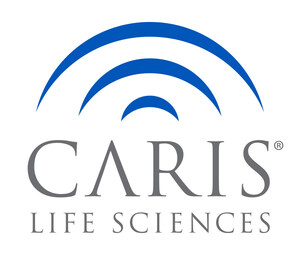Caris Target Now™ ASCO Presentations Underscore Importance of Molecular Profiling in Pancreatic Cancer and Uveal Melanoma
-Promising, Actionable Targets Identified in Both Diseases -
CHICAGO, June 4, 2012 /PRNewswire/ -- Caris Life Sciences announced today that two data presentations underscore the importance of molecular profiling in patients with pancreatic cancer and uveal melanoma, with several potentially promising therapeutic targets identified in both diseases. The two datasets, both of which were assembled using the company's Caris Target Now™ evidence-based molecular profiling service, were presented here today at the 2012 annual meeting of the American Society of Clinical Oncology (ASCO).
"As with many types of cancer, there is a great need for new approaches to treat pancreatic cancer and uveal melanoma," said Tom Spalding, Oncology Senior Vice President and Group Head at Caris Life Sciences. "The genomic sequencing technology of Caris Target Now, combined with rigorous review of the relevant clinical literature, can be used to identify tumor-specific biomarkers that appear to be promising therapeutic targets, pointing the way toward personalizing therapy for patients living with these diseases."
Pancreatic Cancer Data
Daniel Von Hoff, M.D., of the Translational Genomics Research Institute (TGen) in Phoenix, Ariz., presented results from a study in which Caris Target Now was used to identify biomarkers in specimens from 1029 patients with pancreatic cancer, using a wide array of analytical techniques including immunohistochemistry (IHC), fluorescence in situ hybridization (FISH), and DNA sequencing.
The analyses identified numerous actionable targets including KRAS, RRM1, thymidylate synthase, ERCC1, SPARC, and various proteins implicated in inflammation, DNA repair, epigenetics (influencing the behavior of a cell without directly affecting its DNA), and protein turnover. Identification of these targets could guide the design of clinical trials for future therapeutic development that may improve survival in patients with pancreatic cancer.
"Our study reiterates the commonality and importance of KRAS mutations in pancreatic cancer, a phenomenon that needs a renewed targeting effort," commented Dr. Von Hoff. "For each of the other targets identified, clinical trials are already in development. These include trials of agents that inhibit topoisomerase II, target SPARC, affect protein and nucleotide turnover, and target epigenetic and inflammatory pathways. Some of these trials focus on methods to enhance drug transport into pancreatic tumors, which may improve outcomes in this disease."
Uveal Melanoma Data
In a separate presentation, a team of Caris Life Sciences researchers led by Zoran Gatalica, M.D., D.Sc, presented results from their investigation of novel therapeutic targets in uveal melanoma, the most common primary intra-ocular malignancy of the adult eye. The investigators conducted DNA and RNA analysis on samples from 49 uveal melanoma patients. They also investigated amplification of epidermal growth factor receptor (EGFR) and mutational analysis of several oncogenic proteins on a smaller patient subset.
Dr. Gatalica and colleagues focused their investigation on two biomarkers for which therapies are being tested in patients with uveal melanoma: the protein cKIT, which has been found in up to 87% of primary uveal melanomas [1],[2],[3]; and an enzyme known as O-6-methylguanine-DNA methyltransferase (MGMT). They found overexpression of cKIT in 74% (28 out of 38) of samples at the protein level and in 45% (13 out of 29) at the RNA level. They also observed low expression of MGMT in 40% (16 out of 40) and 34% (10 out of 29) of samples at the protein and RNA levels, respectively. EGFR expression, copy numbers, and protein levels were low in the patients tested.
"Although uveal melanoma represents approximately 3% of all melanomas [4], there is a great need for improved therapies, as the prognosis is poor for patients with advanced disease," stated Dr. Gatalica. "Our data suggest that cKIT is a promising target for pro-angiogenic drugs such as sorafenib and sunitinib, and that low expression of MGMT may indicate the likelihood of a favorable response to alkylating agents such as dacarbazine and temozolomide. We look forward to results from several ongoing clinical trials of these agents in patients with advanced uveal melanoma."
About Caris Life Sciences
Caris Life Sciences is a leading biosciences company focused on developing and delivering innovative molecular diagnostic, prognostic, and theranostic services. The company's evidence-based molecular profiling service, Caris Target Now™, matches molecular data generated from a patient's tumor with biomarker/drug associations derived from the world's leading clinical cancer literature. Caris Target Now uses the most advanced and clinically relevant technologies to provide physicians with information to aid in the selection of personalized cancer treatments more likely to work for each patient. Caris is also developing a series of blood tests based on the company's patented Carisome™ platform — a proprietary, blood-based testing technology for diagnosis, prognosis, and theranosis of cancer and other complex diseases. Through the precise and personalized information provided by technologies like Caris Target Now and Carisome, the company believes that the quality of healthcare can be dramatically improved, while also significantly reducing costs. Headquartered in the Dallas metroplex, Caris Life Sciences offers services throughout the United States, Europe, and other international markets. To learn more, please visit www.carislifesciences.com or www.caristargetnow.com
[1] Mouriaux F, Kherrouche Z, Maurage CA, Demailly FX, Labalette P, Saule S. Expression of the c-kit receptor in choroidal melanomas. Melanoma Res. 2003;13(2):161-6.
[2] Pache M, Glatz K, Bösch D, et al. Sequence analysis and high-throughput immunohistochemical profiling of KIT (CD 117) expression in uveal melanoma using tissue microarrays. Virchows Arch. 2003;443(6):741-4.
[3] Pereira PR, Odashiro AN, Marshall JC, Correa ZM, Belfort R Jr, Burnier MN Jr. The role of c-kit and imatinib mesylate in uveal melanoma. J Carcinog. 2005;4:19.
[4] Singh AD, Turell ME, Topham AK. Uveal melanoma: trends in incidence, treatment, and survival. Ophthalmology. 2011;118(9):1881-5.
SOURCE Caris Life Sciences
WANT YOUR COMPANY'S NEWS FEATURED ON PRNEWSWIRE.COM?
Newsrooms &
Influencers
Digital Media
Outlets
Journalists
Opted In





Share this article